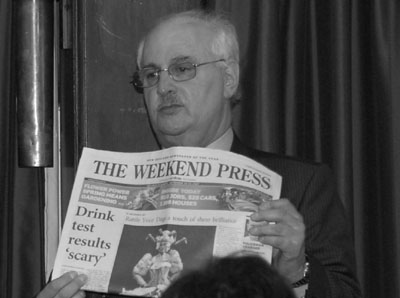Vicki Hyde announces the Bent Spoon and Bravo Awards for 2012.
CONSUMER magazine has won its second Bent Spoon Award from the NZ Skeptics for continuing to promote homeopathic products as a viable alternative to evidence-based medical treatments.
In its September 11 2011 review of anti-snoring products, Consumer consulted a medical herbalist who was quoted as saying that “all homeopathic remedies may work wonders for one person and do nothing for another” and that “homeopathy is best prescribed on an individual basis, after extensive consultation”.
Homeopathy is known to exploit the well-recognised placebo effect where the body heals itself in many cases. Any “wonders” worked can be attributed to that effect, as homeopathic solutions are made up solely of water – a fact not known by 94 percent of New Zealanders purchasing such products.
Yet again Consumer has failed to point out that there are no active ingredients in a standard homeopathic product. Surely this should raise consumer protection alarm bells, akin to someone buying a microwave and receiving a cardboard box which they’re told will heat food via the cosmic power of the universe if you think hard enough…
Consumer did note that another expert had pointed out that “the efficacy of homeopathic remedies had not been demonstrated convincingly in evidence-based medicine.” This caveat was not adequate as far as the NZ Skeptics were concerned, particularly as the homeopathic products had a prominent place at the head of the list.
We’ve seen the homeopathic industry use selective quotes as part of their marketing and advertising strategy to get unwitting customers to pay $10 for a teaspoon of water. No doubt Consumer’s inclusion of homeopathic products will be used to boost business, despite the admission by the NZ Homeopathic Council that homeopathic products have no active ingredients. Disturbingly, Consumer‘s expert doesn’t seem to be aware of this admission, stating that ‘extra’ active ingredients could help.
A number of people had raised concerns about Consumer‘s willingness to feature such dubious products, with one nominator saying that the article had “destroyed Consumer NZ’s reputation as a organisation New Zealanders can trust”.
Consumer last won the Bent Spoon in 1992 for a similarly lacklustre examination of non-evidence-based health products. We’d hoped they’d learned something by now as our country’s main consumer advocate. What’s next – endorsing rubber bracelets as power-boosters for our athletes? Approving the sale of specially trapped sunlight in bottles to treat the blues? They should leave such shonky stuff to the tabloid press.
In addition to the Bent Spoon, the NZ Skeptics’ Bravo Awards praise a number of attempts to encourage critical thinking over the past year. These included:
- Margo White, for her health columns in the New Zealand Listener. It’s great to see informed writing on health issues, based on research and evidence, rather than the large amount of low-grade items we usually get, based on press releases and thinly disguised advertorial material. A number of White’s columns were nominated for a Bravo, such as the item ‘Lies, Lies and Eyes’ which reported research indicating there is no evidence for the claims by proponents of neurolinguistic programming (NLP) to be able to tell if a person is lying or not simply by looking at the direction in which they glance.
- Whanganui District Health Board member Clive Solomon, for supporting evidence-based medicine as the core focus for hospital care (see p3, this issue)
- The awards were psychically conferred at the NZ Skeptics Conference in Dunedin.

